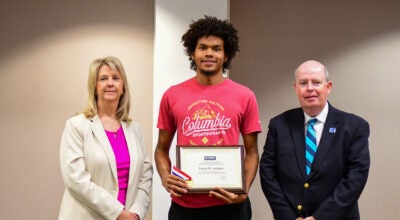Goose Creek State Park hosts annual Field Days
Published 9:05 pm Thursday, November 3, 2016

- TRICKLE DOWN: Debbie Boyd, education coordinator with the Beaufort Soil and Water Conservation District, demonstrates how a landscape affects water’s movement.
Students are getting up close and personal with nature this week at the ninth-annual Dan Windley Environmental Field Days at Goose Creek State Park.
Organized by the Beaufort Soil and Water Conservation District, Beaufort County fifth-graders rotate through six stations with topics of wildlife, vermiculture, soils, wetlands, forestry and conservation. The program began Tuesday and ends today.
Representatives from Weyerhaeuser’s Cool Springs Environmental Education Center, Natural Resources Conservation Service, N.C. Wildlife Resources Commission, N.C. Cooperative Extension and BSWCD led discussions and activities related to their particular topic.
Debbie Boyd, education coordinator at BSWCD, said the idea behind Field Days is to show students the role they play in preserving the environment.
Boyd said BSWCD wants the students to know how important the environment is now and will be for future generations.
“The event takes the coordination and cooperation of all the agencies involved for this event to come together,” she wrote in an email.
Boyd discussed water conservation, sources of pollution and how river basins played a role in the flooding after Hurricane Matthew with her student groups.
BSWCD’s Dan Windley originally established environmental Field Days about 30 years ago, according to a press release, and geared it toward fourth-graders. In 2008, the program was revamped for fifth-graders to better align with the schools’ curriculum and help prepare that age group for end-of-grade testing in science.
Environmental specialist Joseph Hawley said he spoke to the students about the benefits of wetlands and some of the animals that are found in that habitat.
With a total of 12 student groups passing through his station on Thursday, Hawley said he does his best to keep the students interested in the topics being discussed.
“I try to ask them a lot of questions,” he said.
N.C. Wildlife Officer Benjamin Spaulding spoke with the fifth-graders about species native to the state, with tanned animal skins, molds and imprints for a hands-on experience.
Visibly passionate about his topic of discussion, Spaulding said he wants the students to be exposed to wildlife and understand its importance.
“Environment is No. 1. You can’t eat money,” he said. “We try to get young people to remember what we eat doesn’t come out of a grocery store.”
Spaulding said a lot of the hands-on resources, such as the animal skins, are new to the students, and it’s something he didn’t have access to when he was a fifth-grader.
Echoing Boyd’s sentiment, Spaulding said he wants the children to know the importance of preserving nature for the sake of future generations.
“With all the technology and stuff going on in the world, young people are clueless about hunting, fishing and trapping,” he said.




